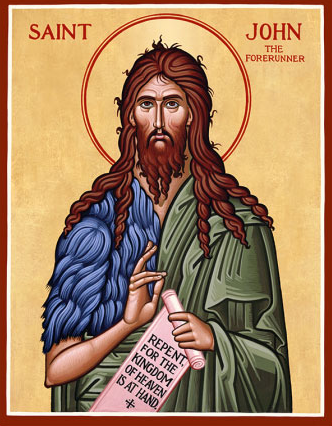 Could John the Baptist be called a ‘minimalist’?
Could John the Baptist be called a ‘minimalist’?
What is minimalism?
Minimalism is the intentional promotion of the things we most value and the removal of everything that distracts us from it. Richard Holloway, the former Anglican Bishop of Edinburgh said, “Simplicity, clarity, singleness: These are the attributes that give our lives power and vividness and joy as they are also the marks of great art.” Minimalism has a long history. For example, it was a hallmark of the Cynic movement in Ancient Greece and of the Essenes, a Jewish sect in Palestine. After the Second World War, the term became associated with a school of modern art. Today, minimalism has become one of many essential tools to help us live more simply so that our children can simply live when they get older. Right now, we need minimalism to save God’s creation from man-made mass extinction and runaway climate chaos.
Was John the Baptist a minimalist?
Historians and theologians have long investigated a possible involvement by John the Baptist with the Essenes, the Jewish sect which practised simple living. In Luke, chapter 3, John tells the people that anyone with ‘two coats must share with anyone who has none’, and likewise with food. John also tells the soldiers to, ‘be satisfied with your wages’. Jesus’ ministry was different in many ways, but his minimalist message was similar to John. Jesus tells his disciples to ‘carry no purse, no bag, no sandals’, (Luke 10: 4). Minimalism in first century Palestine or 21st century Ireland could still be considered counter-cultural. However, in the last fifty years, the pressure has grown for more of us to embrace minimalism as a survival mechanism to counteract consumerism.
Some thoughts about The Birth of John the Baptist (June 24th)
The birth of John the Baptist occurred six months before the birth of Jesus according to the narrative in Luke 1:26. Traditionally, St John’s Eve has been a time of celebrations. For example, historically this has been a good time to collect herbs which are then dried for use throughout the winter. The name of the healing herb, St John’s Wort, is a reminder of this St John’s Eve custom.
Perhaps St John’s Eve is also a good time to think about how simply St John lived. Simple living was important to both John and Jesus. Two thousand years on, scientists are clearly saying that if humanity is to make the transition to a sustainable way of life within the next twelve years, simple living is again vital.
(John 10:10) Jesus said, ‘I came that you may have life’ – (not needless stuff!)
How about being more intentional to live more simply as the day to celebrate The Birth of John the Baptist approaches?
- Shopping: Do I really need this product? Why?
- Stuff: Box up things which are not often used. After three months, if you have not opened the box, give the contents away.
- Tools: Can I borrow it? Can I share it? Can I get one second hand?
- Foods or Flowers: Were they grown ethically, locally, organically? Are they for sale without packaging? Could we grow them ourselves?
- Don’t watch TV for a period. Did you miss it? What happened instead?
Please encourage your parish to become more ecological. Become a part of Eco-Congregation Ireland. Check out www.ecocongregationireland.com
